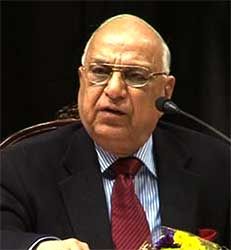 | « Back to article | Print this article |

'The Constitution says the government, the council of ministers, shall be responsible to the House of the People which is the Lok Sabha, not to the Rajya Sabha.'
'Let us hope they will be able to show better floor and political management through a process of, if necessary, give and take.'
Constitutional expert Subhash C Kashyap outlines the legislative options before the government over the Land Bill, in a conversation with Sheela Bhatt/Rediff.com
The Right to Fair Compensation and Transparency in Land Acquisition, Rehabilitation and Resettlement (Amendment) Ordinance 2014 was promulgated on December 31, 2014.
The bill to that effect, known more famously -- and infamously -- as the Land Bill, was passed by the Lok Sabha last month. However, the Rajya Sabha is yet to give its stamp of approval to the legislation.
An ordinance has to be passed in both Houses of Parliament within a stipulated period. The law states that an ordinance 'shall be laid before both Houses of Parliament and shall cease to operate at the expiration of six weeks from the reassembly of Parliament.'
Since the Rajya Sabha could not give its approval within this time-frame, a new ordinance on land acquisition was issued last week, which is different from the first one and carries nine amendments.
What exactly is the likely legal trajectory of the Land Bill which is so dear to Prime Minister Narendra Modi and his government?
 Sheela Bhatt/Rediff.com/ spoke to Subhash C Kashyap, former secretary general of the Lok Sabha, to find out the legal options before the government.
Sheela Bhatt/Rediff.com/ spoke to Subhash C Kashyap, former secretary general of the Lok Sabha, to find out the legal options before the government.
Kashyap, image, left, an expert on the Constitution who has worked in the Lok Sabha since the days of India's first prime minister Jawaharlal Nehru, explains the Constitutional provisions of the Land Bill in the course of the conversation.
There is talk about calling a joint sitting of Parliament to clear the Land Bill. Can you explain when the government can convene a joint sitting?
If a situation arises where the two Houses of Parliament disagree in regard to any bill other than a Constitutional amendment bill or a money bill, then a joint sitting of the two Houses can be called by the President.
The final disagreement will be presumed if one bill is passed by one House and is totally rejected by the other House or, if a bill after being passed by one House is referred to the other House and the other House does not pass it for six months.
So two conditions, if it has been six months after the original House referred it to the other House, or if the other House has finally disagreed on the bill, then the joint sitting of Parliament can be convened.
Meaning, the Rajya Sabha has to reject the Land Bill, or the government will have to wait for six months till it can call a joint sitting?
It can do two things. The Rajya Sabha can reject it or pass it with amendments. If it passes it with amendments, then it goes to the originating House (in the case of the Land Bill it will have to go back to the Lok Sabha).
If the originating House accepts it, then it becomes law. If it does not accept it, then it comes back.
What will be the trajectory of the Land Bill in view of the absence of a consensus in the Rajya Sabha?
It is too hypothetical. Your question is imaginative and the answer will also be imaginative.
In case, one House passes the bill and the other doesn't, then the government has two options. Either they take it as a bill and forget about the law, or when both Houses are not in session they can issue an ordinance (as it is done now).
'When both the Houses are not in session' means when one of the Houses stands prorogued, then they can issue an ordinance which has the same force as the law passed by Parliament.
The qualification is, it should be placed before Parliament within six weeks. It should be passed by Parliament within six weeks of its meeting. And if it is not passed within six weeks, it ceases to have effect.
The Land Bill 2013 was amended, the ordinance was issued, then it was put up in the Lok Sabha which passed it by a majority vote. Now it is not yet placed in the Rajya Sabha, in between came the break in the Budget session, and the ordinance has been approved by the President for the second time.
What are the options legally available to the government if the Rajya Sabha does not approve the bill with the nine new amendments?
First, the Rajya Sabha has been prorogued. If it was still in recess, it would have been in session. So it is not a case of recess now, but of the House not being in session at all. It is in prorogue.
Now since it is not in session, which means both the Houses are not in session, in which case an ordinance can be issued.
The ordinance that has now been issued is not exactly the same as the one that was issued earlier. So now when the two Houses meet again, presumably it will be introduced as a bill in the Lok Sabha again.
It will be introduced in the Lok Sabha and if the Lok Sabha passes it, it will be referred to the Rajya Sabha and then the same process will follow.
But if the Rajya Sabha rejects it, then the options before the government are, as we discussed before, either to forget about it and say that it cannot become a law or to pass an ordinance.
Yes, they can re-promulgate the ordinance. They can re-promulgate the ordinance with amendments.
If the government does not wish to go in for a joint sitting immediately, they can go in for re-promulgation of the ordinance.
If it is not rejected outright or referred to a committee or delayed in other ways or kept pending, then if six months pass without the bill being approved, only then can they call for a joint sitting.
What are the do's and don't's if and when a joint sitting is called for the Land Bill?
Well, if a joint sitting is called, there are rules for the joint sitting which are a part of the Lok Sabha rules, they are added as an annexure in the book of rules of the Lok Sabha.
It provides that the Speaker for the Lok Sabha will preside and the secretary general of the Lok Sabha will be the secretary general for the joint sitting and all decisions will be of members both present and voting.
Since the Lok Sabha is the much larger House, with 543 members, the chances are that the majority in the Lok Sabha will be reflected in the decision-making in the joint sitting. A majority of the total members, present and voting, of the two Houses.
A lot of people, particularly senior Opposition leaders in the Rajya Sabha, criticise the government for bringing in so many ordinances and bulldozing the Rajya Sabha. Do you think it is unhealthy to bring in so many ordinances?
Well, there have been occasions when a large number of ordinances have been brought in. The point is that the Constitution provides for it, permits it. There is nothing unconstitutional or illegal.
The rest is a matter of political perception or propriety or morality, things of that kind which are very subjective.
Each one according to their own perception will have views regarding it. Some people would think it is not proper to have so many ordinances, while others would think it was very necessary that such laws should prevail.
What was the main idea behind giving lawmakers this option of a joint sitting by the makers of our Constitution?
The first thing is that we have a representative parliamentary system of democracy. And the Constitution categorically provides that the government, the council of ministers, shall be responsible to the House of the People. It doesn't say Parliament.
It categorically says that the government, the council of ministers, shall be responsible to the House of the People which is the Lok Sabha, not to the Rajya Sabha.
So the government is dependent upon the House which is directly elected by the people and is not dependent upon the majority or minority in the other House, that is done by design, that is done on principle.
Second, ordinance-making powers were given to the President, it helps the government to take care of situations where both the Houses are not in session and the government finds it necessary to have a law.
So the President has been given the power to issue an ordinance which will have the same force and effect as a law made by Parliament. It is the President's power.
These are the words used in the Constitution. An ordinance 'has the same force and effect' as the law made by Parliament... so it is for all practical purposes a law. Parliament comprises the two Houses and the President. The only provision is that it will be subject to approval by the two Houses of Parliament when they meet.
Is there a confusion left by the Constitution-makers? If there was clarity about ordinances and force was given behind ordinances, then why is the Rajya Sabha able to resist it?
Arun Jaitley recently told the Rajya Sabha that senior Rajya Sabha MPs are resisting the Lok Sabha's agenda to run the government.
That is a political comment... He is commenting on the situation that the Lok Sabha passes a bill, and the Rajya Sabha does not allow it to be passed. He is stating the factual position and making a political comment. It has nothing to do with the Constitution or law.
As I said, the Constitutional scheme is that the government is dependent on the House of the People. The government continues so long as it has majority support in the House of the People. So the Rajya Sabha cannot displace the government.
The ruling party will not have a majority in the Rajya Sabha in the next 18 months or so.
Nothing unusual about it. The government might have a majority in one House and not in the other. It happens all over the world in democratic countries. In the US there are occasions when one party is in the majority in the House (of Representatives), but not in the Senate. But the government continues, the country continues, there is no problem.
But it is a problem for the prime minister's agenda and his wish list...
It is a question of better political management. And better floor management.
Let us hope that they will be able to show better floor and political management through a process of, if necessary, give and take.
(Communist Party of India-Marxist MP) Sitaram Yechuri says the government's haste in passing bills is tyranny of the majority.
What do you expect in a democracy? Decisions have to be taken by the majority. We discussed earlier, for the continuance of the government only a majority in the House of the People is necessary.
So you can say it is the tyranny of the representatives of the people or the tyranny of the people because in a democracy, people are supposed to rule over themselves through the representatives they elect.
In a democracy, decisions have to be taken by the majority, the people are elected by the majority of votes.
Now whether tyranny by majority is better or by minority is better, is a question.
Image: Youth Congress workers protest the Land Bill at Parliament Street in New Delhi. Photograph: PTI Photo.